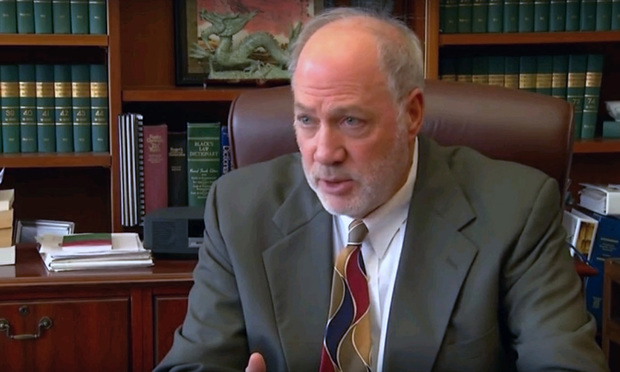Lancaster President Judge Gets 'Letter of Counsel' for Allegedly Invoking His Office During Traffic Stop
The JCB made public Monday afternoon that it had sent Lancaster County President Judge Dennis Reinaker a letter of counsel earlier this month, after finding that he violated a provision of the Judicial Code of Conduct barring judges from "impropriety and the appearance of impropriety."
December 31, 2019 at 01:13 PM
4 minute read
 Dennis E. Relnaker, President Judge of the Court of common Pleas of Lancaster County. Photo: YouTube
Dennis E. Relnaker, President Judge of the Court of common Pleas of Lancaster County. Photo: YouTube
The Judicial Conduct Board has decided not to bring formal disciplinary charges against Lancaster County's president judge after he appeared to invoke his judicial office during a tense traffic stop earlier this year. The disciplinary body has instead sent the judge a "letter of counsel," which is an informal measure that can be used against the judge if any future disciplinary issues arise.
The JCB made public Monday afternoon that it had sent Lancaster County President Judge Dennis Reinaker a letter of counsel earlier this month, after finding that he violated a provision of the Judicial Code of Conduct barring judges from "impropriety and the appearance of impropriety." Along with making the letter public, the announcement said the board felt the letter was merited because the president judge had self-reporter the incident, the incident was an isolated event, and Reinaker was cooperative with the investigation.
READ THE LETTER:
The disciplinary action stems from an incident in the spring that attracted significant media attention after Lancaster Online obtained a video of the traffic stop in June.
According to the letter, which was signed by JCB chief counsel Richard Long, Reinaker was pulled over for a traffic stop April 26 along Pitney Road in Lancaster. The JCB said that, soon after pulling his vehicle over, Reinaker stepped out and asked the police officer, "What do you think you're doing pulling me over? For blowing my horn?"
The officer told him to get back into his car, but before he did, the judge said "You better check the registration on this plate soon, mister."
Soon after, the officer released Rainaker from the stop, saying "Have a good day, judge," the JCB said.
According to the letter, Reinaker self-reported the conduct June 14, which was two days before Lancaster Online posted the video. The JCB also noted that Reinaker denied that he was abusing the prestige of the judicial office, but argued that he was irritated at being stopped for, what he believed to be, no reason . The JCB also noted that Reinaker admitted the behavior was inappropriate and that it could create the appearance of impropriety.
Ultimately, the JCB determined the conduct violated Canon 1, Rule 1.2 of the Code of Judicial Conduct, which says judges must "act at all times in a manner that promotes public confidence in the independence, integrity, and impartiality of the judiciary, and shall avoid impropriety and the appearance of impropriety."
The letter, however, said that, while the board found enough evidence to press disciplinary charges, the mitigating circumstances of Reinaker having self-reported the incident, his cooperation with the investigation, the fact that the incident was brief and only occurred the one time, Reinaker's apology to the office and his decision to accept responsibility for the conduct, warranted the lesser discipline.
The letter of counsel was sent to the president judge Dec. 13, and Reinaker signed it more than two weeks later on Dec. 30.
Less formal "letters of counsel" are not always made public, but the JCB's announcement said that disposing of Reinaker's case with the informal measure was contingent on the president judge agreeing to make the letter public.
Philadelphia disciplinary attorney Ellen Brotman, who is not involved in the case, said that, if the conduct from April marked the first time Reinaker has been disciplined or the subject of a complaint, a letter of counsel seems to be the appropriate disciplinary measure. The fact that Reinaker self-reported, she said, likely went a long way towards the board agreeing to the less formal means.
"There's a public embarrassment aspect of the discipline and also a public acknowledgement that even what one would consider a minimal abuse of judicial power is not acceptable," Brotman said.
A review of publicly available disciplinary records on the JCB's list of cases instituted since 2014 did not show any instances where the JCB resolved a case by sending a "letter of counsel;" however, in 2017, the JCB announced that it sent a similar letter to Centre County Judge Jonathan Grine, after finding that he ran afoul of judicial conduct provisions through his personal relationship with the county district attorney. That announcement similar noted that Grine had cooperated with the investigation and had apologized for his conduct.
Reinaker's attorney Christopher A. Ferro of York did not return a message seeking comment.
This content has been archived. It is available through our partners, LexisNexis® and Bloomberg Law.
To view this content, please continue to their sites.
Not a Lexis Subscriber?
Subscribe Now
Not a Bloomberg Law Subscriber?
Subscribe Now
NOT FOR REPRINT
© 2025 ALM Global, LLC, All Rights Reserved. Request academic re-use from www.copyright.com. All other uses, submit a request to [email protected]. For more information visit Asset & Logo Licensing.
You Might Like
View All


Trending Stories
Who Got The Work
J. Brugh Lower of Gibbons has entered an appearance for industrial equipment supplier Devco Corporation in a pending trademark infringement lawsuit. The suit, accusing the defendant of selling knock-off Graco products, was filed Dec. 18 in New Jersey District Court by Rivkin Radler on behalf of Graco Inc. and Graco Minnesota. The case, assigned to U.S. District Judge Zahid N. Quraishi, is 3:24-cv-11294, Graco Inc. et al v. Devco Corporation.
Who Got The Work
Rebecca Maller-Stein and Kent A. Yalowitz of Arnold & Porter Kaye Scholer have entered their appearances for Hanaco Venture Capital and its executives, Lior Prosor and David Frankel, in a pending securities lawsuit. The action, filed on Dec. 24 in New York Southern District Court by Zell, Aron & Co. on behalf of Goldeneye Advisors, accuses the defendants of negligently and fraudulently managing the plaintiff's $1 million investment. The case, assigned to U.S. District Judge Vernon S. Broderick, is 1:24-cv-09918, Goldeneye Advisors, LLC v. Hanaco Venture Capital, Ltd. et al.
Who Got The Work
Attorneys from A&O Shearman has stepped in as defense counsel for Toronto-Dominion Bank and other defendants in a pending securities class action. The suit, filed Dec. 11 in New York Southern District Court by Bleichmar Fonti & Auld, accuses the defendants of concealing the bank's 'pervasive' deficiencies in regards to its compliance with the Bank Secrecy Act and the quality of its anti-money laundering controls. The case, assigned to U.S. District Judge Arun Subramanian, is 1:24-cv-09445, Gonzalez v. The Toronto-Dominion Bank et al.
Who Got The Work
Crown Castle International, a Pennsylvania company providing shared communications infrastructure, has turned to Luke D. Wolf of Gordon Rees Scully Mansukhani to fend off a pending breach-of-contract lawsuit. The court action, filed Nov. 25 in Michigan Eastern District Court by Hooper Hathaway PC on behalf of The Town Residences LLC, accuses Crown Castle of failing to transfer approximately $30,000 in utility payments from T-Mobile in breach of a roof-top lease and assignment agreement. The case, assigned to U.S. District Judge Susan K. Declercq, is 2:24-cv-13131, The Town Residences LLC v. T-Mobile US, Inc. et al.
Who Got The Work
Wilfred P. Coronato and Daniel M. Schwartz of McCarter & English have stepped in as defense counsel to Electrolux Home Products Inc. in a pending product liability lawsuit. The court action, filed Nov. 26 in New York Eastern District Court by Poulos Lopiccolo PC and Nagel Rice LLP on behalf of David Stern, alleges that the defendant's refrigerators’ drawers and shelving repeatedly break and fall apart within months after purchase. The case, assigned to U.S. District Judge Joan M. Azrack, is 2:24-cv-08204, Stern v. Electrolux Home Products, Inc.
Featured Firms
Law Offices of Gary Martin Hays & Associates, P.C.
(470) 294-1674
Law Offices of Mark E. Salomone
(857) 444-6468
Smith & Hassler
(713) 739-1250






